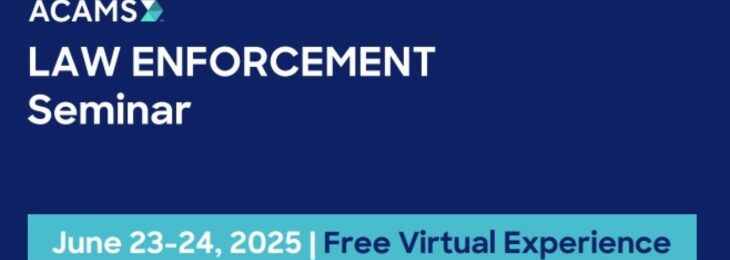
I started my career as an agency recruiter in July 2008. I thought everything was going fine until two months later when Lehman Brothers went bankrupt and the U.S. officially joined the Great Recession.1 Honestly, I did not know what a recession was, but I quickly learned the devastation it could leave in its wake. Over the next two years or so, I spoke to hundreds and thousands of anti-money laundering (AML) and compliance officers, who all had a story to tell about where they were in their career and how they had arrived to that point. What I remember most was the plethora of people who had made their way into the industry by pure luck. Many (if not a small majority) had discovered financial crimes compliance (FCC) and compliance unintentionally and only a small number of people I have spoken to deliberately joined this field of work before the USA PATRIOT Act came to fruition in 2001. Like Pawneet Abramowski, principal financial crimes risk expert and advisor at PARC Solutions LLC, says, “Today, you see candidates coming from law enforcement, military or other government services, as well as college graduates who seek out AML/CTF roles as the compliance field has gained a main street awareness due to the increase in terrorist acts and the financial crisis impacting the largest banks globally.” Now, graduate schools are offering degrees in AML, compliance and risk. I know recent arrivals to AML and compliance that left the front office as successful traders and bankers, went to graduate school for degrees in risk and compliance, and returned to work with their former colleagues. They predicted more personal success in the future in compliance and risk than they did in the front office. I cannot express enough how big of mentality change this is within the industry.
AML, FCC and Office of Foreign Assets Control (OFAC)/sanctions (which will be referred to as AML and compliance) offer people distinguished career paths for both new graduates and seasoned professionals who are looking for a new calling. The demand for talent has increased astronomically in compliance and in AML because of numerous billion dollar fines, the growing importance of data analytics and fintech/regtech diversification in the financial services industry, and an increase in the budgets and types of personnel needed to run effective programs. You can use your understanding of the history and current circumstances of financial crimes prevention to work your way into a role in this profession. However, is this career right for you?
Emulate the Best
I can relate to AML and compliance professionals who found their career through a “happy accident.” I did not go to school to become a talent acquisition specialist; I went to school with the goal of becoming a doctor (sorry, mom). But through a few purposeful moves and a couple of happy accidents, I joined the profession that I am still in a decade later. However, over that decade, more and more people have purposefully worked and studied their way into these fields as AML and compliance have gone from specializations to professions. Although AML and compliance have created stable and fulfilling positions and career paths, they are not for everyone. I have met very fascinating and smart people and I have also witnessed the AML profession change in many ways because of new regulations, heavy fines, tons of pressure from both internal executives and external auditors and government regulators, and evolving technologies. As Shawn Hutton, a director of AML monitoring and investigations at a foreign bank in New York, says professionals today “require good writing skills, organizational thinking, investigative expertise, and the ability to synthesize massive amounts of disparate data to form a coherent answer that is supported both logically and through documentation. There is zero tolerance for errors and the people that will succeed in AML are the ones that pay particular attention to detail while moving quickly in an environment that requires constant multi-tasking.” Now, chief compliance officers and heads of AML and FCC are more important than ever in maintaining a company’s reputation and strong bottom line. The best and most successful people I have met in AML share similar qualities and philosophies. Make sure you share them, too:
- Not “no” or “yes” people: The most successful in AML and compliance come up with creative ways to add to the bottom line. They help front office bankers, traders or salespeople find their success without breaking the law or breaking away from their own values.
- High integrity: This is one value that has no ambiguity. Do the right thing, especially when it is uncomfortable.
- Great relationship managers: As advisors, AML, OFAC and know your customer officers need to have strong relationships with the front office, so they buy into a robust compliance culture and proactively reach out to the second line of defense.
If you are an entry-level employee within your AML and compliance program, you must take Abramowski’s advice: “Invest in your own career, learn and gain as much knowledge from your peers and managers. Go above and beyond once you land the role, volunteer for projects outside of your daily responsibility and deliver on the projects. The knowledge you gain by stepping up and doing things that provide you a learning opportunity while giving the visibility in front of management is irreplaceable.”
The AML Environment and How to Break In
In 2001, the USA PATRIOT Act created many new roles within financial institutions. Many of today’s respected AML professionals started their careers at that time when Bank Secrecy Act (BSA) programs were going through a major flux and many of them only had to raise their hand to take on the responsibility of creating and enhancing their company’s program. Now, compliance and AML have a much more key role in financial services and raising your hand is not enough to get into the industry.
The AML employment market also changed after the HSBC fine of $1.9 billion in 2012. The HSBC fine was not the biggest, but it did set a precedent and created a sense of anxiety that compelled boards of directors and executives to increase FCC budgets. Between 2012 and today, we have witnessed fines against banks of all shapes and sizes and, quite recently, a bank losing the license to do business. These fines and the specter of enforcement actions combined with ever-increasing regulatory demand (think Rule 504), systems implementations, external audits and just plain old business-as-usual obligations have given rise and clout to a growing community of independent contractors (IC) and consultants. IC and consultants are not new concepts by any means, but they have become a highly present category of employees in FCC programs over the last decade. Technically, employers use IC and consultants because of the ease and speed of increasing and decreasing the workforce without taking on employment tax liability and benefits costs. During large remediations, employers engage IC and consultants at distinct experience levels, such as project and programs managers, team leads, quality assurance specialists, and senior and junior analysts. The last category (analyst) provides AML and compliance novices the chance to break into the field. Consulting projects have given many professionals their first foray into their current career paths. For example, in 2008, Washington Mutual (WaMU) conducted a look-back project before being purchased by JPMorgan Chase. WaMu engaged hundreds of IC and consultants across the country. However, the bank could not onboard experienced analysts fast enough and began engaging dozens of new graduates, law school graduates and seasoned professionals from other industries. These entry-level consultants learned on the job and attended training courses with the understanding that the project would end and they would have to search for a job again. Many of them made the most of this opportunity and are now vice presidents and directors at their current institution. Weigh the risk and reward of contracting as a way of getting into AML and compliance.
AML and compliance programs have evolved into a group of different verticals with more sophisticated technological tools and systems. As a result, the desired traits of entry-level candidates have evolved in tandem. During the midst of the Great Recession, many new law school graduates were trying to get into compliance and AML because of the decline in legal hiring at banks and law firms. AML and compliance hiring managers were reluctant to bring on lawyers, who they believed should be looking for strictly legal roles. However, lawyers of all levels of experience became popular as the unemployment rate decreased, new regulations became more complex and AML and compliance roles became more lucrative and popular. Hutton makes a good point when he says, “Most recently, the entry-level candidates I see are attorneys and law school graduates. Given the regulatory nature of AML today versus the past, I think the skills that are learned in law school translate well into working with policies/procedures, regulatory interpretation and investigations under heightened scrutiny.” The diversification of personnel has made higher education more valuable for entry-level candidates looking to get into AML and compliance. In addition, the growth of data analytics, AML optimization and the fintech/regtech community and industries have given rise to entry-level roles and paths for technologists, mathematicians and data governance experts.
When you boil it down, the best way to work your way into the AML community is by going to networking events and seminars and by always tweaking your skills. Todd Brungard, CAMS, AML and sanctions risk consulting manager at Crowe Horwath LLP, offers sage advice: “Attend industry events, such as ACAMS chapter events or state banking association events, and network with experienced professionals. They can mentor you to help you develop the skills needed for a successful career. They can also provide contacts who may be looking to hire entry-level employees.” After you confirm that you want a career in AML and financial services compliance, edit your resume, apply to the jobs you think are a good fit and begin researching upcoming events, webinars and conferences. Lastly, never stop learning. Abramowski says it best: “Try to learn about the industry and the subject matter. There are plenty of free resources in this digital age, so take the time to learn before applying for a position. Don't oversell yourself, if you don't know something it will be evident relatively quickly once you start in your role, so it’s better to be honest about what you lack or would commit to learning.”
Words of Wisdom
AML, compliance and risk have turned into distinct career paths that are attracting more professionals with diverse backgrounds than ever before. For instance, data governance, technology and cybersecurity experts, are competing with seasoned compliance professionals, ex-law enforcement, lawyers and former front office specialists. So, although the demand for talent is rising, the competition is growing fierce. In addition, technological evolution will sooner rather than later change the skills needed in AML and compliance programs in the financial services industry. The employment landscape will only become more complex and fluid. If you want a successful career in AML now, you need to understand the current regulatory demands and the events that made AML programs so important. You also should self reflect and figure out whether you have the qualities that great AML and compliance officers share. Remember that the most talented people in AML are lifelong learners, embrace change and risk wholeheartedly without mitigating both to zero, and create symbiotic relationships with lines of business. Hutton emphasizes that AML and compliance professionals “possess several common traits including patience, a sense of humor, logical thinking, a curious nature, the ability to multitask and the desire and ability to make quick decisions in a rapidly changing environment.” To summarize, here are practical tips and food for thought as you go on your journey into a successful AML and compliance career:
- View your resume and professional social media as sacrosanct and works of art. This does not mean to create elaborate resumes on paper or to embellish your credentials on LinkedIn. Your resume and online profiles precede your first contact with potential employers. Make sure your accomplishments, your relevant skills and pertinent experience are front and center. And make sure there are no typos or grammar mistakes. Have multiple people look at your final draft before you let the world see it.
- If you are an entry-level candidate, highlight aspects of your background and skillset that hiring managers are looking for. Brungard mentions that when interviewing entry-level candidates, he “looks for dynamic and intelligent people with skills, including technical prowess, analytical abilities, writing abilities, being innovative and agile, and the ability to learn quickly.”
- Accept every interview request your schedule permits. As an entry-level candidate or someone that is new to financial services compliance, you should keep yourself open to the possibility that any role could be the diamond in the rough. Create your own luck by opening as many opportunities as possible and not declining opportunities before speaking to hiring managers directly (please check out the ACAMS webinar, “‘Acing’ an Interview & Landing a Career in BSA/AML Compliance”).
- Consider continuing education and formal certifications. You can go back to school for a graduate degree and/or obtain a certification from ACAMS. You will never lose when you invest in your future.
- Weigh the risk and reward of taking a contract role. Contract positions are not for everyone. You get paid only when you work, you do not have all the same benefits as full-time employees and you do not have paid time off. However, contracts have given many AML and compliance professionals their first opportunity in this space. The rewards might outweigh the risks.
- Relationships are very important. You will need to build strong and healthy relationships with front office professionals to maintain a compliance program. However, you will also need to build relationships so you have strong advisors, proteges, mentors and insiders that will endorse you for jobs and provide references when you get job offers. Relationships have a very practical purpose.
Compliance might be the right job for you, but financial services might not be the right industry and AML might not be the right vertical. Regulatory scrutiny and enforcement actions have plagued all industries across all verticals. For instance, the pharmaceuticals, healthcare and telecommunications industries have had to bolster their Foreign Corrupt Practices Act/anti-bribery compliance, privacy and cybersecurity programs. Take into consideration other career paths that fit what you want to do.
- Alan S. Blinder, After the Music Stopped: The Financial Crisis, the Response, and the Work Ahead, 2013.










